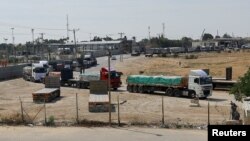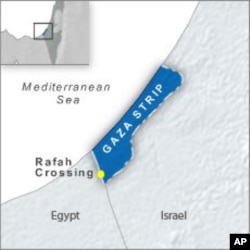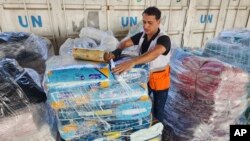U.N. agencies are urgently appealing for Israel’s siege on Gaza to be lifted and for the unimpeded flow of humanitarian aid into the Palestinian territory.
Gaza was placed under a complete siege following the October 7 attack in southern Israel by Hamas militants. No food, water or medical supplies were allowed into the enclave for two weeks. Aid started to come in on Saturday through the Rafah border crossing between Gaza and Egypt.
“Since October 21, three convoys of humanitarian supplies have gone into the strip, with a total of 54 trucks … carrying a mix of food, medical supplies, and non-food items,” said Tamara Alrifai, director of external relations and communications for UNRWA, the U.N. Relief and Works Agency for Palestine Refugees in the Near East.
Alrifai called this “just a trickle in the face of the immense needs of people on the strip.”
UNRWA is the largest supplier of aid in the Hamas-controlled Gaza Strip.
Before the conflict, Alrifai said 500 trucks used to arrive in Gaza carrying a combination of commercial goods and humanitarian supplies, including 45 trucks of fuel, every day.
Speaking from Amman, Jordan Tuesday, she told journalists in Geneva that fuel was almost more important than anything else.
“So far, fuel has not been allowed into the strip. Fuel is extremely urgent because without fuel the trucks themselves cannot move. Without fuel, the generators cannot produce electricity for hospitals, for bakeries and for the water desalination plants.
“Gaza has always had the problem with access to clean drinking water,” she said. “The problem is extremely aggravated now with extremely limited access to water.”
The World Health Organization reports between 1 and 3 liters of clean water per person is available, per day, in Gaza, far below the international standard which calls for a minimum of 15 liters per person per day.
“That is just the bare minimum for drinking, for cooking, for basic hygiene,” said Rick Brennan, WHO regional emergency director for the eastern Mediterranean region. “I can guarantee you, there is hardly anyone in Gaza that has had a shower or a proper bath in the past few weeks."
He said, “We are extremely worried about the spread of infectious diseases. We are hearing about increased cases of respiratory infections. Soon, we will run into diarrheal outbreaks, skin infections, and so on. It is just a matter of time.”
He said hospitals were overstretched, running low on medicines and medical supplies, and lacking the electricity to power generators.
All this, he noted, put thousands of people with chronic diseases “such as kidney disease who require dialysis, people with high blood pressure, heart disease, and diabetes at great risk” because they are finding it difficult to get access to the services they need.
The office of the U.N. High Commissioner for Human Rights reports 1,300 Israeli citizens and residents were killed in the attacks by Hamas militants who invaded Israel. It says Palestinian armed groups also took an estimated 200 people, including children, hostage, which is prohibited by international law.
Since October 7, the agency reports more than 5,000 people in Gaza have been killed, including 2,000 children, mostly in attacks and operations by Israel Defense Forces. It says civilians constitute the majority of those killed in both Gaza and Israel.
In a statement Monday, U.N. human rights chief Volker Türk warned, “This violence will never end unless leaders stand up and take the brave and humane choices that are required by fundamental humanity.”
He called for an immediate humanitarian cease-fire and for saving the lives of civilians “through the delivery of prompt and effective humanitarian aid throughout Gaza, provided according to need and not limited by any other, arbitrary criteria.”
Speaking from his base in Cairo, Egypt, Rick Brennan said that the ongoing bombardment of Gaza for more than two weeks has displaced some 1.4 million people.
“I have been working in humanitarian assistance for 30 years and I cannot remember a humanitarian situation with that number of people being displaced over such a short period of time.”
He said hundreds of thousands of people have taken shelter in UNRWA schools, which are overcrowded and lacking all amenities.
He said, “How do people deal with the daily activities of life? How do you go to the bathroom within that context, with over 500,000 people crammed into these places? As a mother, how do you occupy the time of your children, your toddlers, your young kids when there is ongoing bombardment with nowhere to move?”
He said the situation for people in Gaza was desperate and the territory’s health system would continue to disintegrate as long as hostilities continued.
He warned, “Unless secure passage for the delivery of health supplies across all of the Gaza Strip is assured, and unless additional humanitarian assistance, including fuel, is promptly provided, the consequence will be catastrophic.”
VOA U.N. correspondent Margaret Besheer contributed to this report.






